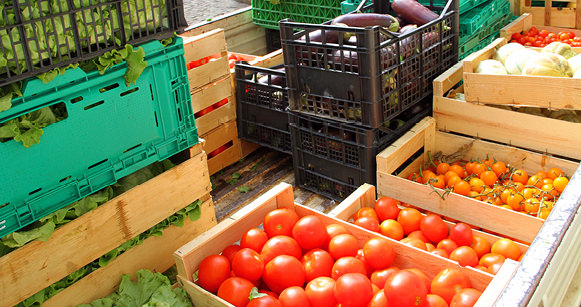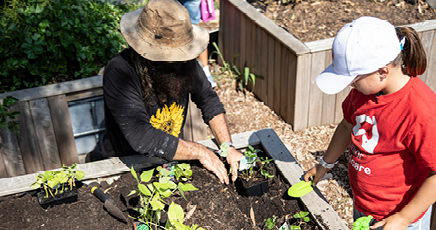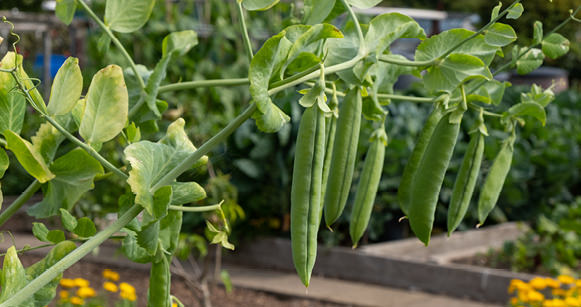LEARNING ACTIVITY
STORY
Beth enjoys watching her parents grow their own fruit and vegetables to feed their family. She enjoys the taste of the fresh fruit and vegetables from their garden. Her teacher had mentioned that there were new Junior Landcare grants available soon to help establish gardens in schools. She had said it would be great to work on what vision the school would like to create a food garden. Next week, they would spend time in class researching and talking about the possibilities for creating a food garden at school. Beth was so excited and had lots of ideas to share that would help prepare their application and hopefully receive a Junior Landcare grant to start a garden at school.

Planning for your food garden helps to build ownership that will help achieve the best results. Planning will also assist you in being successful in applying for relevant Junior Landcare Grants to support the development of your food garden. Use this learning activity to explore exciting ideas, create goals and understand more about successful food garden projects.
This learning activity is part of a sequence of 5 individual learning activities focused on creating a food garden. The order of these learning activities are: vision, site assessment, installing a no dig garden bed, planting and harvesting.
For children to:
• appreciate what they would like to achieve from creating a food garden
• understand the steps involved in creating a successful food garden
• value the responsibilities of creating and caring for a food garden.
Creating the vision for the food garden can be done in any season. As you plan for the year ahead, you will need to consider seasonal and climate variations and their effects on plant growth.
Introduction
Planning a food garden can be a very exciting and beneficial process to keep you healthy and engaged in the great outdoors. Get started with planning and creating a vision for your new food garden. Creating a vision for your garden will help it be on a pathway to success by reflecting on the purpose and assist in the steps to get the best possible benefits. Most young learners will come with some prior knowledge of food gardens. Upon completion of the activity they will have considered important aspects of developing a food garden as well as their vision.
*Time allocation will be dependent on site selection and travel time.
Checklist
Instructions

Step 1
If your location does not have a food garden, creating a vision will help to plan and achieve the best possible results.
In your research phase, find out more about successful food gardens.
Read more about a Junior Landcare case study that focuses on food production. Use the filters for topic and content type to search for a suitable case study to understand more about what can be achieved.
Research and discuss:
- the set up and steps involved
- the benefits
- the challenges
- special ideas.
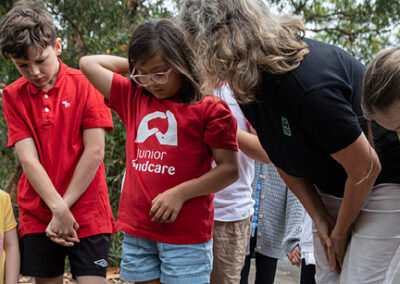
STEP 2
Creating the food garden vision.
- Ask the children what are the benefits of creating a food garden in our local area?
- Discuss the benefits for sustainability, health, learning, expenses and your community.
- What do you think will make your food garden a success?
- Who else can we involve?
You want the best possible outcome, therefore it is ideal to involve as many people as possible in your decision making process. This will help promote ownership and future interest in the food garden.
At a school, this could include interested students, the groundskeeper, volunteers and any other keen participants.
At home, it is good to have a family discussion to focus on what you would really like. Use your research for inspiration.
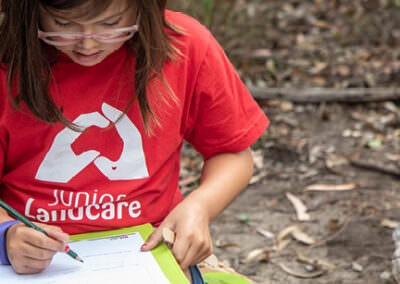
STEP 3
Discuss in small groups:
- who will be responsible
- what resources will you need?
- where can you grow food?
- how big will your food garden be?
What is your food garden vision? What are your goals and your creative ideas? What gets you excited about your planned food garden?
Use the activity sheet to record ideas.
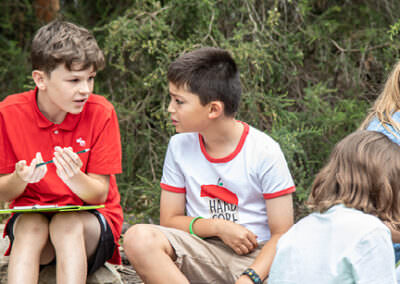
STEP 4
After completing the activity sheet, have the children discuss their ideas and vision with each other.
In the discussion consider:
- limitations and restrictions
- who might be able to help?
- what equipment might we need?
- what budget is required?
Once you have discussed and agreed on your vision, you can go to the next stage of the creating your food garden learning activity.
Extension Activity
Now you have your vision for creating your food garden, discuss how can you share your ideas and encourage others to help you. Design a poster or write a story for your newsletter or a social media post so others can be inspired to get involved. How and where would you like them to contact you? Can you set a date for a meeting to discuss the vision?
What skills do you already have to create a food garden? Are there other skills that you need from people in your community? Where can you find out more? Contact your local Landcare group by searching the National Landcare Directory to find a local grant recipient near you. We encourage you to strengthen your connection with the Landcare community. Starting a Junior Landcare group onsite to help organise and gather support for your food garden activities is a great beginning.
Curriculum and Framework Links
SCIENCE
Year 2: ACSSU030, ACSHE035
Year 3: ACSSU044, ACSIS054
Year 4: ACSHE062, ACSIS064
Year 5: ACSHE083
Year 6: ACSSU094, ACSHE100
Year 7: ACSHE120
Year 8: ACSHE135
HUMANITIES AND SOCIAL SCIENCES
Year 2: ACHASSI042
Year 3: ACHASSI052, ACHASSI059, ACHASSI060
Year 4: ACHASSI080, ACHASSK088, ACHASSK090
Year 5: ACHASSI102, ACHASSK120
Year 6: ACHASSI122, ACHASSI130
DESIGN AND TECHNOLOGIES
Year 2: ACTDEK003
Year 3/4: ACTDEP017
Year 5/6: ACTDEP019
Year 7/8: ACTDEK032
HEALTH AND PHYSICAL EDUCATION
Year 2: ACPPS018, ACPPS022, ACPPS023
Year 3/4: ACPPS036, ACPPS040, ACPPS041
Year 5/6: ACPPS054, ACPPS059
Year 7/8: ACPPS073, ACPPS078
ETHICAL UNDERSTANDING
Exploring values, rights and responsibilities
PERSONAL AND SOCIAL CAPABILITY
Social awareness
CROSS CURRICULUM PRIORITY
Sustainability
MY TIME OUR PLACE: FRAMEWOK FOR SCHOOL AGE CARE
Outcome 2 and 4
Reference List
ONLINE RESOURCES
Australian Organic Schools has a range of online resources for teachers, students and parents on school food gardens.
WATCH
Growing your own food highlights the benefits of growing your own food in a school environment. 3.15
Watch Designing a school garden from Gardening Australia for lots of inspiration 4.32 minutes.
Life lessons in a living classroom from ABC Education demonstrates the benefits of a food garden in high school. (4 minutes)
READ
Outdoor Classrooms: a hand book for school gardens. Authors: Carolyn Nuttall & Janet Millington is a valuable printed resource for school garden development and learning.
Just for Kids
Check out our fun activity Veggie garden game.
We value your feedback
When you have finished this learning activity, please tell us what you think with our survey.
Your feedback will help Landcare Australia improve the activities in the Junior Landcare Learning Centre.
Why not try one of our other Junior Landcare learning activities?
Love Letters to the Land
Biodiversity|First Nations Perspectives|Food Production|Waste Management
Creating a food garden: planting
Food Production
Creating a food garden: installing a no dig garden bed
Food Production
Creating a food garden: harvesting
Food Production
